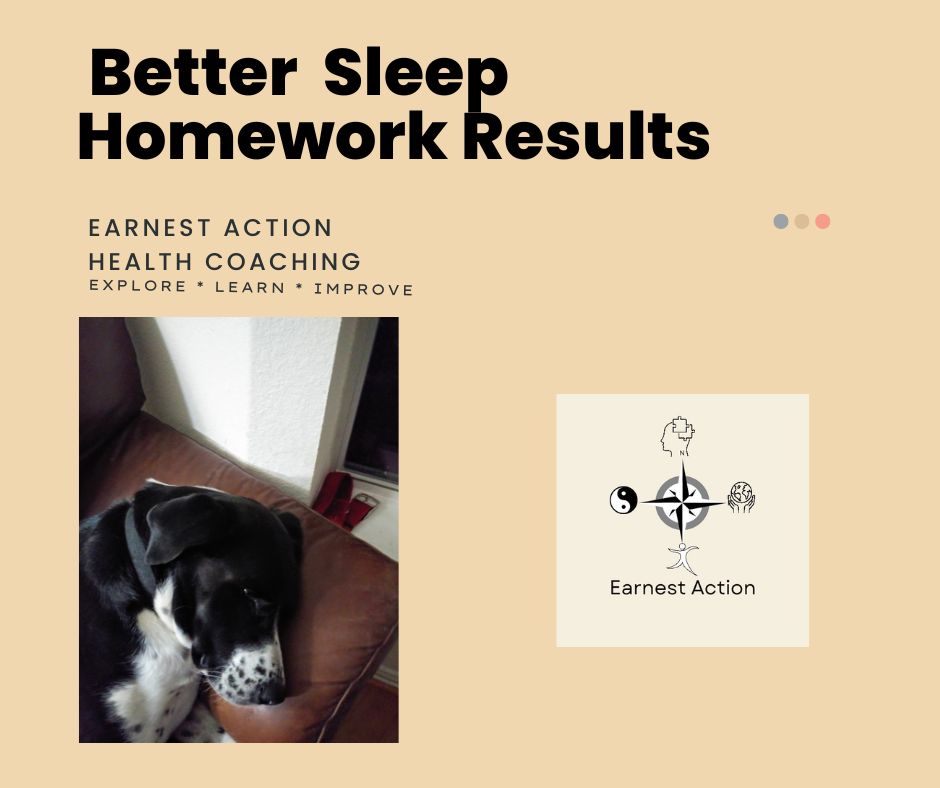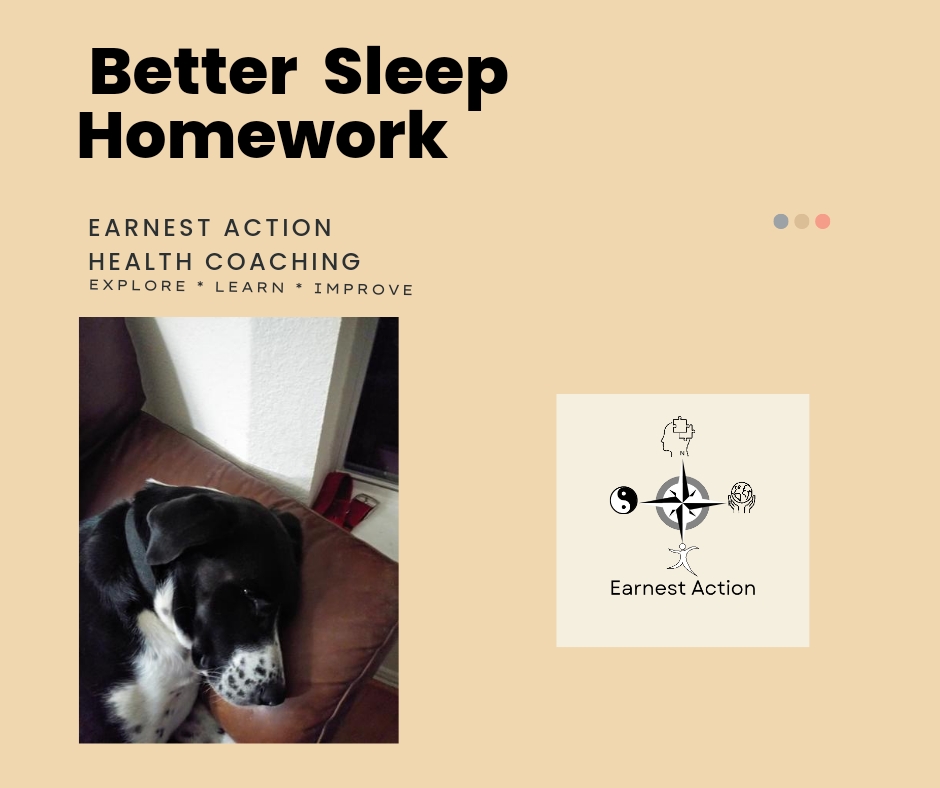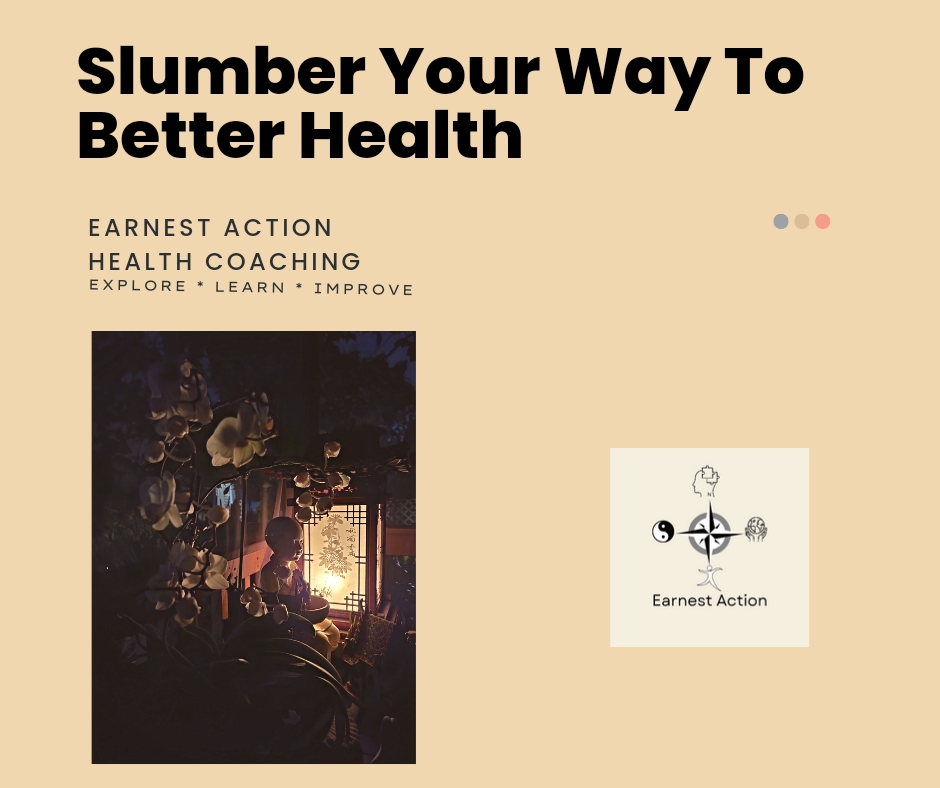Slumber your way to better health. This is the first of a series of articles I will present. In this post, I will describe what health concerns can improve with better sleep and its purpose for your body. I hope you will use this information to jump-start progress in your health areas of focus. In the second post of the series, I invite you to participate in Sleep Homework for one week. I will participate along with you. In the final post of the series, I’ll share my results and I will provide some additional evidence about the longer-term effects of a sleep hygiene program.
What Health Concerns Improve With Sleep?
For many of us, weight gain is an area of concern. Lack of adequate and poor quality sleep affects hormone levels that cause you to be hungrier. In addition, when you have low energy and feel fatigued you are less likely to adhere to your exercise program. So you end up with More Calories in and Fewer Calories out and that equals more weight gain. Weight gain could contribute to even more health issues.
Increased risk of heart attack and stroke. How much do you ask? Studies estimate that people over the age of 45 who get less than six hours of sleep per night are twice as likely to have heart disease (National Sleep Foundation,2018). Blood sugar regulation is often degraded, possibly leading to diabetes.
Sleep problems interfere with your immune system’s function. Immune system signaling molecules (cytokines) can lead to chronic inflammation. This is not the good inflammation that helps us heal from wounds and injuries, but excess inflammation. Chronic inflammation contributes to artery disease leading to cardiovascular disease. The list goes on to include type 2 diabetes, arthritis, and depression. Finally, at a time when we are all concerned about COVID, Irwin 2015, indicates that sleep deprivation may lower the effectiveness of vaccines and increase susceptibility to disease.
Poor sleep is associated with anxiety and depression. Some people sleep too much and others too little. Disturbed sleep can contribute to emotional health issues causing us to be more fragile. Who has not had a bad night’s sleep and not felt that we could deal with the challenges of our days. There have been times when I have been brought to tears after a poor night’s sleep by the routine challenges at work. Too much time is spent in fight or flight response so both the brain and the body are affected.
The fogginess in our minds from fatigue results in a higher rate of accidents. You may experience poor work performance.
Many studies have linked inadequate sleep with Alzheimer’s disease. Later in the article, we will see that poor sleep can result in the buildup of amyloid proteins that are linked to the disease.
About 50 to 70 million adults have a sleep disorder. For many of us it is not insomnia, but poor or inadequate sleep. Some of the symptoms include:
- day time fatigue.
- trouble falling asleep
- waking too early in the morning
- unable to fall back to sleep once you wake up.
What is restorative sleep?
Of course, the standard answer we hear is that adults should get 7 to 8 hours of sleep and teenagers should get one more hour. As many of you already know, being in bed does not mean we get quality sleep. For people like me who suffer pain from injuries or arthritis during the night, losing an hour or two of sleep each night is not unusual. A new study out of the University of California (Adams, Heather) has identified “efficient sleepers” that have Familial Natural Short Sleep (FNSS). These people can feel perky and energized after 5-6 hours of sleep. The author refers to this new study as proof that the quality of sleep is more important than quantity. However, most of the assessments of quality are made subjectively by how a person feels.
Drake, Christopher L et al. in a Jul 14 journal of clinical sleep medicine article examines how difficult it is to validate the measures of adequate sleep. They developed and tested a Restorative Sleep Questionnaire (RSQ). Tools to evaluate sleep onset or initiation, sleep interruptions, alertness on waking and length of sleep are common. By using focus groups a nine item questionnaire was developed in two versions. One version was administered daily and the other weekly. Both tests were found to have internal consistency reliability (> 0.90). In the focus group good sleep was described as :
- falling to sleep easily,
- sleeping without waking,
- feeling rested when waking up.
Still, we don’t have an objective measure. I have read that 20-25 % of the time during sleep spent in REM is one measure frequently. I use a fitness tracker. I track total hours slept, amount of time awake, and % of the time in REM. Normally, when I feel rested is consistent with these measures falling into a certain range. More about that next time.
How Does Sleep Benefit Your Body?
During the day your brain is busy processing the visual cues it receives. We speed through our days reacting to events. Often these activities are taking place automatically without much mindfulness. During the night our brain cleans itself and removes waste products. Our brains may shrink by as much as 60% which allows the cerebrospinal fluid to mix with the interstitial fluid. This mixing washes away wastes like amyloid proteins that accumulate during the day. The meditative state allows memories to be consolidated. Some believe our creativity is sparked by the cleaning process resulting in dreams.
Sleep Cycle
Sleep affects several hormones. The first is melatonin, the sleep hormone. To understand more let’s talk about the hormones involved in the sleep cycle. We fall to sleep because GABA (a neurotransmitter gamma-aminobutyric acid) is activated. When we are awake, acetylcholine is secreted by the hypothalamus, which dampens the effect of GABA. When you are active during the day another chemical , adenosine, builds up and hinders acetylcholine. As the day ends the blue light from the sun causes melatonin to begin to rise. Adenosine breaks the wall of acetylcholine and GABA takes over. As you sleep your melatonin levels peak causing deep sleep. As your temperature bottoms out and cortisol, the stress hormone rises, then you dream. When the sun rises melatonin begins to fall and cortisol reaches its peak. Since cortisol triggers many other hormones, when the cycle is disrupted then fragmented sleep may result. Also, electronic devices can delay melatonin production causing the onset of sleep to be delayed.
Hormones
The final hormones we will discuss are human growth, hunger hormones (leptin, ghrelin, and insulin), and estrogen and progesterone hormones. Not only does human growth hormone govern your body’s ability to repair itself, but it also affects how you metabolize sugar. When HGH is disrupted, then pre-diabetes or diabetes can be complicated. Poor sleep can mean that not enough leptin is produced leaving the hormone that makes you hungry, ghrelin to run wild. Ever have a day that you just could not get enough to eat – ghrelin. Finally, estrogen and progesterone are two of the hormones triggered by cortisol. In both men and women, these hormones affect thyroid function and can slow metabolism.
Next time we’ll talk about sleep hygiene and make a plan to do some homework. Sharpen those pencils.
Please leave a comment. Let me know what you think or share your story about how sleep is working for you. Contact me to suggest other topics.
Disclaimer. The information provided in this article may not be appropriate for all people. If you are not currently exercising or have or suspect you have conditions like cardiovascular, metabolic, or renal disease, then you should consult your physician before considering making any changes suggested.




Leave a Reply